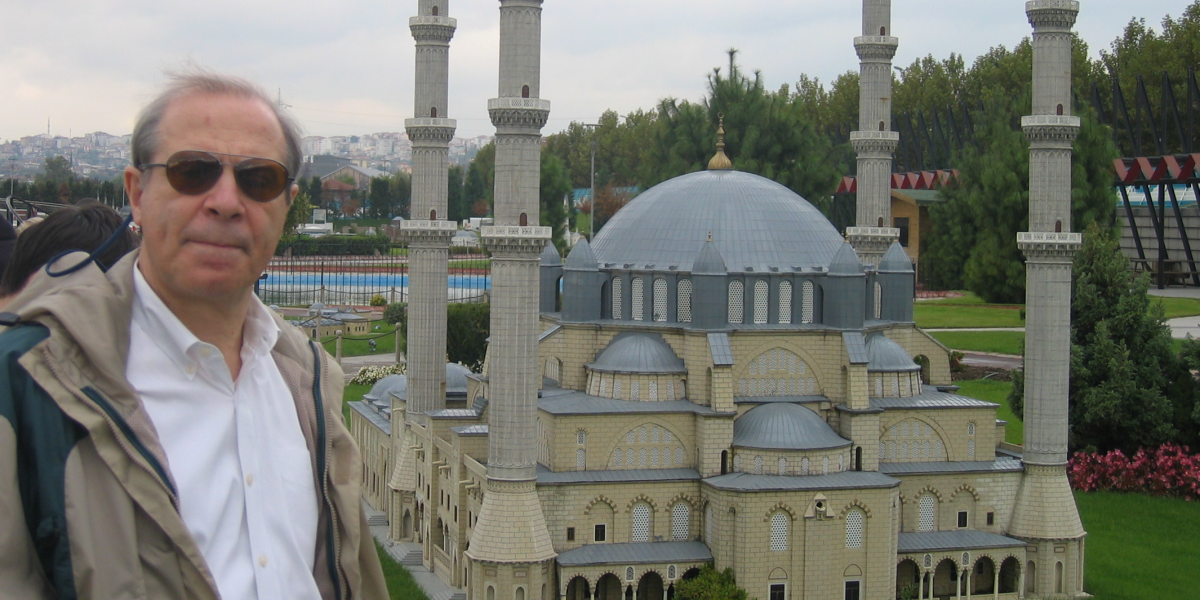
Leonard, a writer, an educationist, a history-lover, and an avid reader and traveler, has found everything he needs to lead a fulfilled life in Turkey — where two opposite cultures meet and thrive together. He established his new home in Turkey in 2008 by some quirk of fate, and today, ten years later, he knows that his future is tied with Turkey. To find out more about his expat life in this magical country, follow us as we unfold Leonard’s story.
Hi Leonard, please introduce yourself. Where are you from, what are you doing in Turkey, and what were you doing before you arrived?
I am a New York native who led a somewhat eventful life. I worked with inner-city kids for the Boy Scouts and owned a literary bookstore in Los Angeles, before becoming a teacher, then administrator at two colleges on Long Island, creating and managing language programs primarily for immigrants and foreign students. My parents were also foster parents. I grew up with brothers of different racial and ethnic backgrounds so I have always been accustomed to seeing faces unlike my sitting across the kitchen table.
What brought you to Turkey? How long have you been in the country?
One of my assistants, Ali Rıza Esmen, kept suggesting I visit Turkey and when he returned to work in the aeronautical industry in 2007, I visited him in Istanbul and fell in love with the city and the country since we travelled around quite a bit during my stay. I returned in 2008 to be a witness at his wedding, and one of his friends introduced me to someone who was looking for a manager of the English Preparatory Program at this new two-year college in Beykoz, Istanbul. I accepted the job since I always wanted to live in or near Europe, and Turkey seemed ideal for that purpose. I started in October 2008, and apart from one year travelling back and forth between Istanbul and New York trying to establish exchange programs between colleges, I have been here ever since.
What is the process of moving to Turkey?
Moving to any country is just a matter of commitment. In 2010, I decided that Turkey would be the place where I would spend the rest of my life, so I shipped part of my belongings here and put the rest in storage. My home here is thus a combination of the familiar mixed with the new.
What is your favourite thing about Turkey, and what is your least favourite thing?
My favourite thing about Turkey is the people. They are warm, hospitable, kind (especially to foreigners), and not unlike the Mediterranean people of my heritage. My least favourite thing about the country is the lack of good restaurants offering international cuisine.

How would you describe Turkey in one sentence?
T-shirts here proclaimed Turkey as the world's largest museum, and I think that sums it up for me.
How is today's expat job market in Turkey?
There are many teaching opportunities for English native speakers both in the public and private schools here. I have also met many expats from EU countries that are engaged in joint business ventures here, but the Americans I've met are mostly employed in education.
How easy or difficult it is to find accommodation in Turkey, and what type of accommodation is available for expats?
It isn't very difficult to find accommodation in Turkey, though some landlords hesitate to rent to expats because they do not necessarily stay very long. Purchasing property is another matter. Though there are many affordable places for sale, it is difficult for foreigners to obtain a mortgage from Turkish banks, so the vast majority of purchases are done without mortgages.
What are the biggest holidays in Turkey?
The biggest holiday here is Bayram that follows the one-month-long fast of Ramadan. Many businesses close down shop, schools, banks, and government offices close, and almost everyone goes on holiday, so hotels are booked months in advance. It is only really three days but the government usually extends the holiday period from seven to ten days, and most Turks will also visit family during this time bringing gifts. Children will knock on neighbours' doors expecting candy, and everyone is especially festive.
What is some essential etiquette in Turkey?
Both men and women greet each other here with either a kiss on both cheeks or an embrace. Handshakes are considered a Western form of greeting and not as common. Men, though, should be careful about embracing women they don't personally know, and many conservative women shy away from physical contact with men outside their families. The offering of cay (tea) or coffee when visiting or doing business is also very common here, even while shopping or getting a haircut.

How do you find the lifestyle in Turkey?
The Turkish lifestyle depends on where you are. Istanbul is a modern, crowded, busy city with horrendous traffic congestion and can be hectic at times. İzmir and Ankara are more relaxed. İzmir actually reminds me of Southern California. People here tend to spend long, leisurely dinner hours together and breakfasts on the weekends are an enjoyable affair.
How is the transportation system in Turkey? How do you move around?
Public transportation varies and is relatively inexpensive. There's a good bus system, metro trains are usually clean and run frequently throughout the day and evening, the ferries in cities on the coasts are great, there are also mini-buses (dolmuş) which run frequently throughout all the cities, and taxi stands are usually at entrances/exits of metro stations. The highway system has vastly improved over the last decade, and only Istanbul has major congestion. Airfare is also reasonable, and there are many flights available throughout the country and beyond Turkey's borders.
How is everyday life for you in Turkey?
Since I write full-time, I spend four to five days writing and reading. I also own over 1000 DVDs and CDs, so I listen to music or watch a movie most nights. I tend to meet friends for a meal or a Turkish coffee in the evening a few times a week. I also take walks in good weather along the coast and go to the movies at a mall in Izmir every week, followed by. I also average one trip a month either in Turkey or to Europe. These trips could be to explore a city or to visit historic landmarks or both.
There are many bars that feature music, as well as concert halls and theatre groups. I have enjoyed seeing plays that I am familiar with, like Hamlet, in Turkish and have no difficulty following it. Turks love to sit in cafés in the evening drinking cay or coffee or enjoying the vast variety of sweets. One can sit for hours in conversation or just people watching.
Do you feel that you have adapted to your new life?
I find I have adapted well to life here and apart from missing family and old friends back in the US, I can easily find things to amuse me. Perhaps there aren't natural history museums here but I can find those in other cities. I can, though, find nature here and I love the sea. When I find I miss going to the theatre, I arrange a trip to London where I see shows, visit museums, and eat international cuisine. Also, Sofia, Kiev, Berlin, Bucharest, Rome are all within a two-hour plane trip. The only things I can't find nearby are my family and old friends, but I have made many new ones along the way.
What is your opinion on the cost of living in Turkey?
With the exchange rate being almost four lira to every one US dollar, the standard of living for an expat is much higher in the US. For instance, I do not have to work to maintain my lifestyle here since my retirement income is more than adequate. Also, housing is much cheaper here. I had a three-bedroom apartment in one of the best neighbourhoods of Istanbul and only paid 600USD a month including all utilities. In Izmir, everything, including dining out and entertainment, is 25 to 30 percent less expensive than in Istanbul. The same is true of Ankara. A typical lunch out costs between 3 to 12 USD per person. A glass of wine is typically 5USD. Beer is cheaper. A loaf of freshly baked bread will cost about 30 cents. A delicious Turkish breakfast complete with a selection of cheeses and meats, olives, sliced tomatoes and cucumbers, fresh baked toasted bread, an assortment of homemade jams and honey, fresh butter, all the tea you can drink and an omelette added with your hardboiled egg costs approximately 8USD in Istanbul. I spend on the average 200USD a month for groceries and I often cook at home. Riding the metro costs less than a dollar and teachers get a discount of approximately 40 percent.
What is something that you would like to do in Turkey but haven't had the opportunity to do yet?
There are just more places to explore. The first Christian church is in Antakya and I haven't been there yet. I also did not take a hot air balloon ride when I visited Cappadocia. I haven't taken the daily ferry to Rhodes from Marmaris yet.
What do you think of the local cuisine? What are your favourite dishes?
The local cuisine is quite varied depending on region but finding a good Chinese restaurant or a Korean or Thai or an English breakfast is almost impossible unless, of course, you live in five-star hotels. When I first came in 2007, you could not find a cup of drip coffee (called filter coffee here) anywhere but nowadays most coffee shops will have it. You can even find some pork products, like bacon and a variety of pork sausage as well as Italian salami, in some upscale markets, as well as imported parmesan cheese, though there is a domestic variety of it. Beef, lamb, chicken, turkey, duck, goose can be bought at many meat markets and there are numerous fish markets in coastal communities in the cities. The produce is generally fresh and sold in season, and every community has a one-day open market referred to here as a food bazaar. The kebabs are plentiful, the pide (Turkish style pizza) delicious, and the sweets are outstanding.
What do you miss the most about your home country?
I miss family, my old friends, and because I come from New York, I miss going to the theatre, the opera, the variety of museums, watching foreign films with English subtitles, and the amazing variety of restaurants. I try to get back to the US every year.
Have you had a moment where you almost felt like leaving Turkey?
Now and then when I hear of the death of a relative or an old friend, I think I should return to be near those I have loved most of my life, but it passes. I have my life here as a full-time writer which would be different back in the US because I could not have the standard of living I enjoy here without working. My personal freedom, plus the fact that I am in the part of the world that most fascinates me, keeps me here.
Can you give some useful tips that soon-to-be expatriates in Turkey might benefit from.
There is some advice I would give anyone contemplating moving here. First, banking. I would keep at least one US credit card for online shopping. It is very difficult for a foreigner to get a Turkish credit card. It took me six years to finally get a Turkish credit card and that only happened because I was working in the private industry sector and the company I was working for sponsored me. I would also advise not to close their bank account in the US. They should get their Social Security and/or pension checks directly deposited into a US bank and then use any ATM here to withdraw money as needed to redeposit into their Turkish bank. Banks do not issue a checkbook here so everything is done with one's bankcard or a credit card. Be careful of what bank you use here, too, since the staff has limited or no English skills. İşBank is quite accommodating to foreigners. You will also need a Turkish bank account and in some cases a residency card to open utility accounts here. It's best to go with a Turkish native to these offices because again there are few, if any, people working there that speak English.
If you had to advise an expat on five items to bring with them to Turkey, what would they be?
That would vary individually for each of us. I have my books, some artwork, some items that have been in my family for generations, and these things keep me grounded. Other expats I know have shed themselves free from their possessions and started fresh all over here but I have no desire to lose my past, am quite comfortable carrying it with me without having it interfere with being open to the future. But that is me. I can think of nothing that one can't find here to replace whatever it is you didn't bring or find it in some EU country you could easily visit.
What are your plans for the future?
The future is tied in with Turkey.This is now what I write about, expats living among the Turks and relationships that develop or don't develop, in two genres: what I call romantic comedies (my version of The Human Comedy) and mysteries. I plan to delve into the historic novel genre one day since this country is rich in stories from the past, the clash of civilizations played out here time and time again. So Turkey holds much promise for me creatively and there is a connection culturally, too. One finds a home wherever it is one decides to settle at whatever point in one's life one finds oneself settling. Here I am: at home.
If you wish to share your expat story, please contact us.
Thank you,
The Expat.com Editorial Team.



















